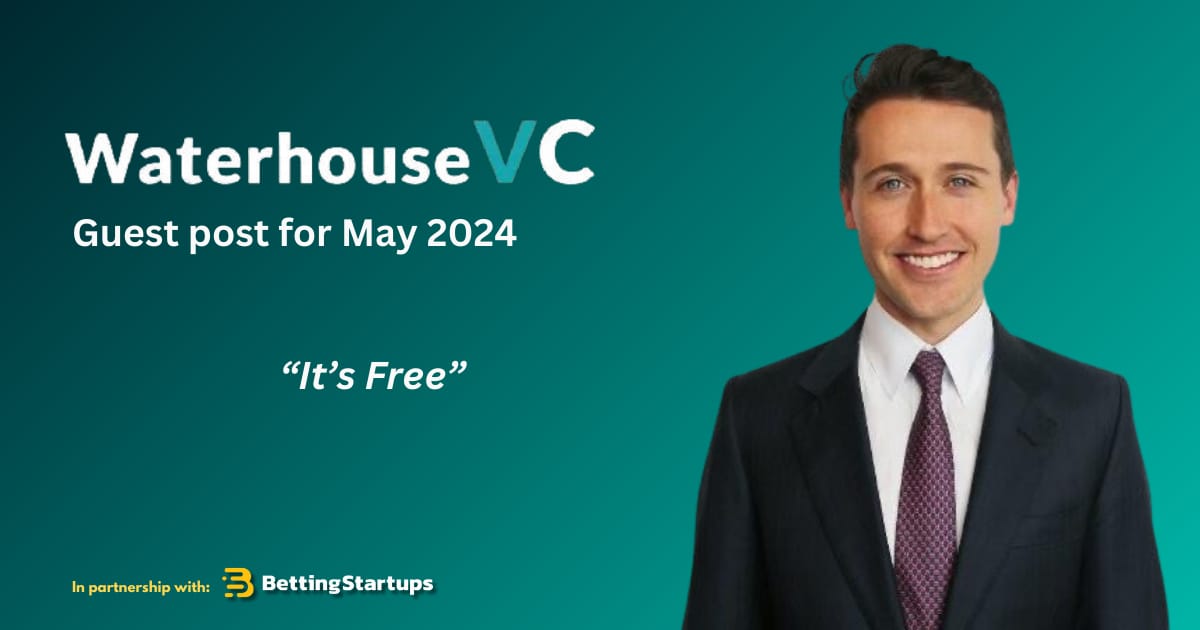- Betting Startups News
- Posts
- Waterhouse VC: It's Free
Waterhouse VC: It's Free
This month, Tom Waterhouse discusses freemium approach

Every month, industry investors Waterhouse VC publish an article that spotlights different aspects of the ecosystem. This month, Tom Waterhouse delves into the freemium model.
Sweepstakes casinos operate without real-money bets. Instead, they utilise a "freemium" approach. The model typically involves virtual tokens obtained at no cost or through indirect purchase, which then serves as play money for accessing in-game features. Virtual currency can be exchanged for cash or prizes following gameplay. The largest sweepstakes casinos have been operating for over 10 years.
In jurisdictions where real money online casino gaming (iGaming) is illegal or unregulated, sweepstakes models effectively give consumers an experience that closely resembles iGaming. Real money casino players would recognise the leading sweepstake casino products, with sweepstakes slot titles produced by developers such as Pragmatic Play, Playtech, and NetEnt.
The global sweepstakes market grew revenues at 89% per annum between 2019 and 2022, reaching US$3.1 billion in 2022 (Eilers & Krejcik Gaming). This is just under half of the entire US sports betting market, which recorded US$7.5 billion of gross gaming revenue in 2022, led by Flutter and DraftKings.
The US has driven the growth of the global sweepstakes market, with iGaming still banned in most US states. Although online sports betting is now permitted in over 30 states, the legalisation of iGaming has progressed much more gradually, with legalisation in just seven states: Connecticut, Delaware, Michigan, New Jersey, Pennsylvania, Rhode Island and West Virginia. In states without iGaming, sweepstakes fills a wagering product gap by offering an iGaming-like player experience.
Perth’s (real) gold rush
Virtual Gaming Worlds (VGW) is the dominant sweepstakes operator, with more than 90% market share (Eilers & Krejcik Gaming), primarily through its Chumba Casino brand. VGW’s customers purchase virtual gold coins to play in Chumba Casino. These coins do not carry any value outside of Chumba Casino. However, players purchasing gold coins receive bonus "sweeps coins", which also serve as game currency and can be exchanged for cash in most regions of the US and Canada.

A selection of VGW’s games. Source: Channel News
VGW was founded by Laurence Escalante in 2010 and now has more than 1300 staff globally, with around 220 in Perth, Australia. In March, VGW reported its results for the first half of the financial year. The company reported a 29% increase in revenue to A$2.8 billion and a 23% increase in net profit to A$207 million. At just 42 years old, Escalante has become one of Australia's wealthiest people, with a fortune of approximately $3.9 billion (Australian Financial Review) and a circa 70% ownership share of VGW. Escalante joins 28 year old Ed Craven on the rich list. Craven co-founded Melbourne-based crypto wagering operator, Stake.com, in 2017. In 2021, Stake recorded revenues of A$1.8 billion and generated a net profit of $550 million (Australian Financial Review), fuelling Craven’s A$3.1 billion fortune.
Pinch me
As a teenager, Escalante’s first job was at Hungry Jacks, earning $5.65 per hour. He then studied Actuarial Studies and Economics in Sydney, whilst working in retail at The Reject Shop. Today, Escalante’s Instagram account reveals a very different life, resembling most boys’ fantasies.

One of Laurence Escalante’s possessions, a Lamborghini Countach. Source: Instagram
Whilst VGW operates in the US under a Maltese gaming licence, changes to federal sweepstakes regulations or variations in state laws could disrupt VGW and other sweepstakes operators. Furthermore, as more states legalise iGaming, customers are likely to be increasingly attracted to iGaming operators rather than sweepstakes casinos.
The rapid growth of sweepstakes casinos has attracted several new players to the market in recent years, including Stake.US, a sweepstakes adaptation of Ed Craven’s well-known crypto wagering site. The sweepstakes market is forecast to grow at 31% per annum over the next three years, driven by growth in US states that do not permit iGaming (Eilers & Krejcik Gaming).
Aristocrat Leisure has also developed games that offer players an experience resembling iGaming. Over the past few years, Lightning Link Casino, a slot machine simulator, has consistently been the most profitable mobile game in Australia (Sensor Tower). Lighting Link is one of several free-to-play slot machine simulators available in Australia, a jurisdiction where iGaming is not allowed. Unlike sweepstakes models, businesses like Lightning Link are categorised as ‘social casinos’.
The primary distinction between social casinos and sweepstakes lies in the ability to win cash prizes on sweepstakes. While social casinos offer free-play (with the ability to buy additional in-game currency) experiences solely for entertainment purposes, sweepstakes casinos offer the opportunity to win real money rewards. Globally, players spend around US$1 billion (A$1.56 billion) on in-game currency across Aristocrat’s collection of social casino games. In 2020, social casinos generated close to US$7 billion of revenue globally (Australian Communications and Media Authority).

Global revenue for social casinos. Source: Australian Communications and Media Authority